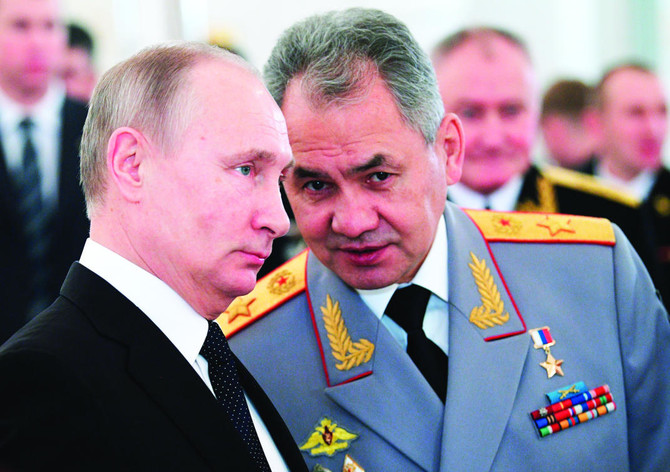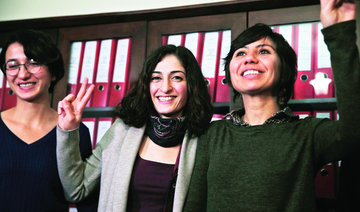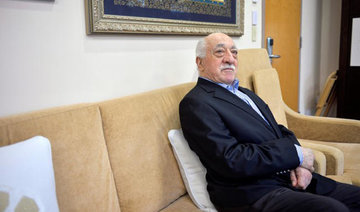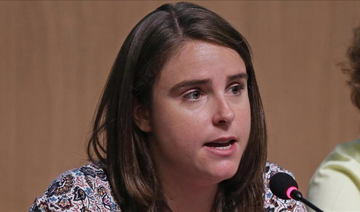ANKARA: Turkey and Russia have signed an accord for Moscow to supply Ankara with S-400 surface-to-air missiles, CNN Turk and other media reported on Friday, finalizing a deal the two countries have been working on for more than a year.
The S-400 deal, reportedly worth about $2.5 billion, has caused concern in the West because Turkey is a member of NATO and the system cannot be integrated into NATO’s military architecture.
It is the latest in a series of moves by Ankara to boost its defense capabilities as it faces threats from militants and extremists at home and conflicts across its borders in Syria and Iraq.
No details of the accord were available and officials were not immediately available to comment. But Sergei Chemezov, head of the Russian state conglomerate Rostec, told the Kommersant daily on Wednesday Russia would supply Turkey with four batteries of S-400s under the deal.
He said Moscow was expected to begin the first deliveries in March 2020 and that Turkey was the first NATO member state to acquire the advanced S-400 missile system.
Earlier on Friday, Turkish newspapers cited President Recep Tayyip Erdogan as saying Turkey would borrow in the Russian currency in a loan deal under the accord.
“We will not borrow in dollars in this loan, we will borrow in rubles,” Hurriyet newspaper quoted Erdogan as telling reporters on his plane, returning from a trip to Africa.
According to Chemezov, Turkey would pay 45 percent of the cost of the agreement up front, with Russia providing loans to cover the remaining 55 percent.
The Russian Finance Ministry will finance a deal from the state treasury, while Russian banks will take part solely in the transfer of funds in the deal, a Russian banking source said.
Relations between Moscow and Ankara deteriorated sharply in 2015 after Turkey shot down a Russian air force jet that it said had crossed into Turkish airspace, but they have since repaired ties despite having backed different sides in the Syrian war.
They are now cooperating on Syrian peace efforts as well as projects in the defense industry and energy sectors.
While pushing ahead with the S-400 project, Ankara has sought to secure defense deals with other countries as well.
In November, Turkey signed a letter of intent with France and Italy to strengthen cooperation on joint defense projects. As a first step, the Franco-Italian EUROSAM consortium and Turkish companies will look into a system based on the SAMP-T missile systems.
Turkey has also invested heavily in the development of its domestic defense industry, with projects encompassing areas including combat helicopters, tanks, drones and warships.
Turkey-Russia missile system deal raises concern in West
Turkey-Russia missile system deal raises concern in West

Palestinian president, Gazans call on Leo XIV to pursue late pope’s ‘peace efforts’

- Gaza’s Christians confident new pope will give importance to enclave’s peace
- Hamas also looking forward to new pope's “his continuation of the late Pope’s path”
RAMALLAH, Palestinian Territories/CAIRO: Palestinian president Mahmud Abbas, along with Gaza's Christians and Hamas leadership are calling on the new Pope Leo XIV to pursue the “peace efforts” of his predecessor Francis.
Abbas sent “best wishes for the success of Pope Leo XIV in the pursuit of his noble task and maintaining the legacy of the late Pope Francis,” said in a statement released by his office late Thursday after the Vatican announced the election of a new pope.
Cardinal Robert Prevost, a little known missionary from Chicago, was elected in a surprise choice to be the new head of the Catholic Church, becoming the first US pope and taking the name Leo XIV.
Abbas highlighted the “importance of the moral, religious and political role of the Vatican in the defense of just causes,” adding that “the Palestinian people and their right to liberty and independence” should be at the top.
In Gaza, the enclave’s tiny Christian community said that they were happy about the election of a new leader of the Catholic Church. They also expressed confidence he would give importance to the war-torn enclave like his predecessor Pope Francis did.

“We are happy about the election of the Pope ... We hope that his heart will remain with Gaza like Pope Francis,” George Antone, 44, head of the emergency committee at the Holy Family Church in Gaza, told Reuters.
The late Pope Francis, who campaigned for peace for the devastated enclave, called the church hours after the war in Gaza began in October 2023, the start of what the Vatican News Service would describe as a nightly routine throughout the war.
“We appeal to the new pope to look at Gaza through the eyes of Pope Francis and to feel it with the heart of Pope Francis. At the same time, we are confident that the new pope will give importance to Gaza and its peace,” Antone added.
War in Gaza erupted when Hamas militants launched an attack against southern Israel, in which 251 people were taken hostage and some 1,200 were killed, according to Israeli tallies.
Since the abductions, Israel has responded with an air and ground assault on Gaza that has killed more than 52,000 Palestinians, according to the Hamas-run health authorities there, and reduced much of Gaza to ruins.
Hamas, in a statement, congratulated Pope Leo saying that it looked forward to “his continuation of the late Pope’s path in supporting the oppressed and rejecting the genocide in Gaza.”
The Holy Family Church compound in Gaza houses 450 Christians as well as a shelter for the elderly and children that also accommodates 30 Muslims, Antone said.
Gaza’s 2.3 million population comprises an estimated 1,000 Christians, mostly Greek Orthodox.
UN Security Council urges halt to fighting in South Sudan

UNITED NATIONS: The UN Security Council on Thursday urged an immediate halt to the fighting in South Sudan and renewed its peacekeeping mission in the warring country for another year.
The UNSC “demands all parties to the conflict and other armed actors to immediately end the fighting throughout South Sudan and engage in political dialogue,” the resolution read.
The text, which called for an end to violence against civilians and voiced concern over the use of barrel bombs, was adopted by 12 votes in favor while Russia, China, and Pakistan abstained.
Rights groups have recently sounded the alarm over the deadly use of the improvised and unguided explosives in the north of the country.
The young and impoverished nation has been wracked for years by insecurity and political instability.
But clashes in Upper Nile State between forces allied to President Salva Kiir and his rival, Vice President Riek Machar, have raised concerns over another civil war.
Thursday’s resolution also extended the UN’s peacekeeping mission, founded in 2011 to consolidate peace, until next April.
It also leaves open the possibility of “adjusting” the force and altering its mandate “based on security conditions on the ground.”
Acting US Ambassador Dorothy Shea said the international community should use the deployment as one tool to bring the country “back from the brink.”
Shea also said it would be “irresponsible” to continue funding preparations for elections after the country’s transitional leadership postponed any ballot by two years last September.
Morocco commutes sentence of detained former minister

- Mohammed Ziane was convicted on ‘embezzlement and squandering of public funds’
- His sentence has been commuted from five to three years
RABAT: A Moroccan court has commuted the prison sentence of opposition figure and former Minister Mohammed Ziane from five to three years, his lawyer said on Thursday.
The former human rights minister had been detained since 2022 and served a three-year term in a different case.
Ziane, 82, the former president of the Rabat Bar Association, was convicted on “embezzlement and squandering of public funds,” said his son and lawyer, Ali Reda Ziane.
The charges relate to funds the Moroccan Liberal Party, or PML — of which Ziane was founder and chief — received during a 2015 electoral campaign.
He was sentenced to five years in prison in July last year.
Even with the court reducing his sentence late Wednesday, “it remains heavy,” said his lawyer.
“He deserves to be acquitted because there was no embezzlement.”
The lawyer said whether the sentences in the two cases would be served concurrently or consecutively remained unclear.
Proceedings in the initial case followed an Interior Ministry complaint on seven counts, among them contempt of public officials and the judiciary, defamation, adultery, and sexual harassment.
But Ziane has alleged that he was detained “because of (his political) opinion.”
The opposition figure had become known in recent years for statements criticizing the authorities in Morocco, particularly the intelligence services.
A US-backed group seeks to take over Gaza aid distribution in a plan similar to Israel’s

- The UN and aid groups have rejected Israel’s moves to control aid distribution
- A US official confirmed the authenticity of the proposal and said the former director of the WFP, David Beasley, is the lead choice to run Gaza Humanitarian Foundation
TEL AVIV: A group of American security contractors, ex-military officers and humanitarian aid officials is proposing to take over the distribution of food and other supplies in Gaza based on plans similar to ones designed by Israel.
The Associated Press obtained a proposal from the newly created group, the Gaza Humanitarian Foundation, to implement a new aid distribution system supplanting the current one run by the UN and other international aid agencies. The UN and aid groups have rejected Israel’s moves to control aid distribution.
It was not immediately clear if the proposal from the new group, which is registered in Geneva, would ease those concerns.
Israel has blocked food, fuel, medicine and all other supplies from entering Gaza for 10 weeks, worsening a humanitarian crisis for 2.3 million Palestinians. It has said it won’t allow aid back in until a system is in place that gives it control over distribution.
The 14-page proposal circulated this week among aid groups and UN officials lays out plans similar to ones Israel has been discussing privately for weeks with international aid groups. The proposal reveals for the first time plans to create the foundation and names the people leading it.
A UN official said last week that Israel’s plans would “weaponize aid” by placing restrictions on who is eligible to receive it.
Aid workers have also criticized the plans, which would centralize distribution at four hubs under the protection of private security contractors. They say the plans could not possibly meet the needs of Gaza’s large and desperate population, and that they would forcibly displace large numbers of Palestinians by driving them to move nearer to the aid.
Under the new group’s proposal, Palestinians would receive pre-packaged rations, potable water, hygiene kits, blankets, and other supplies at the distribution hubs. The group said it wants to partner with the UN and international aid groups in handing out their supplies.
A US official confirmed the authenticity of the proposal and said the former director of the UN World Food Program, David Beasley, is the lead choice to run GHF. The proposal could still be revised and Beasley’s role is not confirmed, the official said, speaking on condition of anonymity to detail plans that have not been made public.
Beasley, a former governor of South Carolina, didn’t immediately respond to messages seeking comment.
Israel accuses Hamas and other militants of siphoning off large amounts of aid. The UN and aid workers deny there is significant diversion, saying the UN strictly monitors distribution.
When contacted Thursday for comment about GHF’s proposal, Israeli officials did not immediately respond.
The Trump administration supports the new group’s proposal, said a person involved in it. The person said GHF would work “within the confines” set by Israel on aid but would be “independent and committed to humanitarian principles” — a nod to UN concerns. The person spoke on condition of anonymity to discuss a plan not yet made public.
“This is a new approach with one focus: Get help to people. Right now,” said US State Department spokeswoman Tammy Bruce.
Ahead of his first trip to the Middle East this week, US President Donald Trump said “a lot of talk” was going on about Gaza and that his administration will soon have more to say about a new proposal. This may include a new push for a ceasefire between Hamas and Israel, the release of hostages and an influx of aid to Palestinians.
Who’s involved?
GHF’s proposal names a 10-member leadership team that includes former senior American military officers, business executives and officials from aid groups. At least two of them have ties to private security companies.
Beasley is listed among them, but the proposal says his role is still “to be finalized.” Beasley is also a senior adviser to Fogbow, a private US firm that participated in the short-lived project delivering aid to Gaza by sea via a US military-built pier.
The AP contacted people listed in the proposal to confirm their participation. Only one responded, saying he was “not on the board.” The person involved in planning said the list was still in flux.
How would it work?
According to the proposal, GHF would initially set up four distribution sites, each serving 300,000 people. That would cover about half of Gaza’s population. The system would be scaled up to meet the needs of 2 million people. But the proposal does not give a timeframe. Aid workers warn that food is rapidly running out in Gaza under Israel’s blockade.
The GHF proposal said subcontractors will use armored vehicles to transport supplies from the Gaza border to distribution sites, where they will also provide security. It said the aim is to deter criminal gangs or militants from redirecting aid.
It did not specify who would provide security but said it could include personnel who previously worked in the Netzarim Corridor, an Israeli-held zone cutting off northern Gaza. A private security company, Safe Reach Solutions, has operated in the corridor.
GHF said people will get assistance based on need with no eligibility requirements. This appears to differ from proposals floated by Israel. Aid workers say Israel has said it intends to vet aid recipients and screen them using facial recognition.
What do aid groups say?
Throughout Israel’s campaign in Gaza, the UN and other humanitarian groups have been carrying out a massive aid program. They have trucked in supplies and distributed them across the territory, going as close as possible to where Palestinians were located.
What has chiefly hampered the system, aid workers have said, are Israeli military operations and restrictions on movement, as well as the low amount of aid allowed to enter even before the blockade. Convoys have also been attacked by criminal groups stealing aid, and hungry Palestinians have sometimes taken supplies from trucks.
Aid workers contacted by the AP cast doubt whether GHF would meet humanitarian requirements for neutrality and independence.
Shaina Low, communications adviser for Norwegian Refugee Council, one of the main organizations in Gaza, said aid groups are concerned the plan will be used “to advance military and political goals.”
By forcing the population to relocate around aid hubs, the system would “depopulate entire parts of Gaza” and could be used to potentially expel the population, she said.
“They are framing (the plan) to fix the problem that doesn’t really exist,” she said, referring to Israel’s contention that it must prevent Hamas from taking aid.
The use of private security companies has also alarmed humanitarian workers. While it’s common for private security firms to operate in conflict zones, they have to respect humanitarian law and at a minimum be fully vetted and monitored, said Jamie Williamson, executive director for the International Code of Conduct Association.
Tamara Alrifai, communications director for the UN agency for Palestinian refugees, which has led the aid effort it Gaza, said the plan was logistically unworkable.
She said the foundation does not appear able to match the current infrastructure needed to distribute food and address other humanitarian needs.
Alrifai called it “a very dangerous precedent” for countries to use “full siege as a tactic of war” to force the abandonment of “existing aid structures and the entire international system that exists and is recognized and start creating a new system.”
South Sudan clashes stopping aid reaching 60,000 malnourished children: UN

NAIROBI: Intense fighting in South Sudan has prevented desperately needed food from reaching some 60,000 malnourished children for almost a month, the UN said on Thursday.
South Sudan has been wracked for years by insecurity and political instability, but recent clashes in Upper Nile State between forces allied to President Salva Kiir and his rival, Vice President Riek Machar, have alarmed observers.
In a joint statement, the World Food Programme and the UN children’s agency, UNICEF, warned that escalating fighting along the White Nile river — a major transport route — has meant “no humanitarian supplies have reached the area in almost a month.”
The area in the north of the country already had “over 300,000 children affected by moderate or severe malnutrition in the past year” and was at “breaking point.”
“Every day makes a difference for a malnourished child in need of life saving treatment,” said WFP’s South Sudan representative, Mary-Ellen McGroarty.
The agencies said almost 2,000 cartons of lifesavingnutrition supplies had been stolen since the uptick in hostilities.
UNICEF representative Obia Achieng said there was an “unprecedented” break in supply lines due to the ongoing fighting, looting, and disruption of the river route.
“If this continues, we are in danger of simply running out of supplies in counties across the state by the end of May 2025, with potentially catastrophic results for the youngest, most vulnerable children,” Achieng said.
South Sudan has been unstable since gaining independence from Sudan in 2011.
Kiir and Machar fought a five-year civil war that cost some 400,000 lives, and was only ended by a power-sharing deal in 2018 that has almost entirely collapsed in recent months.





















